NZ First’s attempt to define ‘woman’ and ‘man’ in law is the latest in a series of member’s bills from the party aimed at countering DEI and woke, writes Catherine McGregor in today’s extract from The Bulletin.
To receive The Bulletin in full each weekday, sign up here.
Another week, another ‘anti-woke’ bill
NZ First has unveiled its latest salvo in what it calls a campaign against “woke ideology”: a member’s bill to define “woman” as “an adult human biological female” and “man” as “an adult human biological male”. Leader Winston Peters says the bill is about protecting “the facts of biology”, and that the “pendulum is swinging back towards common sense” on gender issues.
This is NZ First’s third “anti-woke” member’s bill in as many months, beginning with the “anti-woke banking” bill in February and followed by the proposed removal of “DEI” policies in the public service in March. It also comes days after NZ First associate minister Casey Costello ordered Health NZ to replace the phrase “pregnant people” with “women” in their communications. Yesterday Labour leader Chris Hipkins accused Peters of pursuing “any populist cause” in an attempt to stay above the 5% threshold at the next election, RNZ’s Craig McCulloch reports.
From fluoride to chromosomes
Although the bill is in NZ First MP Jenny Marcroft’s name, Peters is again taking the lead on media communications. This bill replaces her earlier member’s bill requiring binding referendums on local fluoride decisions, a cause that now seems to be taking a backseat to the party’s war on woke.
The bill also quietly supplants NZ First’s more explicit “Fair Access to Bathrooms” bill, which would have fined people for using toilets not matching their sex assigned at birth, McCulloch reports. Peters says the new bill is a more “comprehensive” approach to the same concerns. A cynic might wonder whether this cycling of member’s bills in and out of parliament’s biscuit tin isn’t so much due to a change of heart, but rather a shrewd attempt at keeping NZ First’s favourite cultural flashpoints in the news cycle.
‘Legally incoherent’ and impossible to implement
Writing in The Spinoff this morning, Paul Thistoll of Countering Hate Speech Aotearoa attacks the bill as legally meaningless and logistically absurd. He warns that the UK Supreme Court ruling NZ First is trying to emulate “cannot be imported into our system without flattening our unique legal, cultural and human rights landscape”. Unlike the UK, where gender recognition is “medicalised” and “bureaucratic”, New Zealand’s approach is based on self-ID, a system NZ First itself helped create. Enforcing rigid biological definitions of “woman” and “man” would be impossible, Thistoll argues, without “compulsory chromosomal testing and the establishment of a sex-passport infrastructure” in this country.
Why the UK ruling wouldn’t work here
Last week’s UK Supreme Court ruling, which found that “woman” under the Equality Act refers exclusively to biological females, was celebrated by some British politicians and campaigners – and quickly seized upon by NZ First. But the UK’s Equality Act is fundamentally different from New Zealand’s legal framework, Thistoll points out. Here, trans rights are protected under existing interpretations of the Human Rights Act, and our courts have consistently acknowledged the legal significance of gender identity. In the legal and cultural context of Aotearoa – including the recognition of gender diversity in Māori tradition – the UK ruling holds little relevance. “We are not Britain,” Thistoll writes. “Our legal direction is different by design.”
Read more from The Spinoff:
